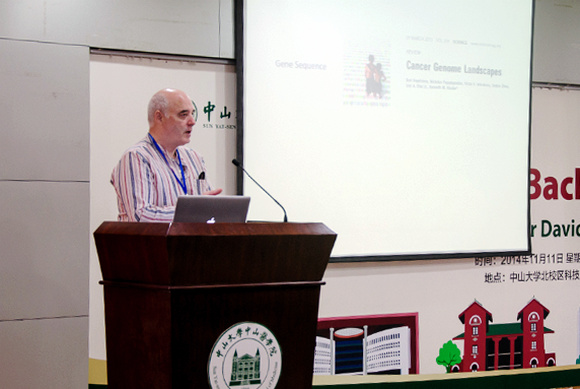Source: Zhongshan School of Medicine
Written by: Zhongshan School of Medicine
Edited by: Wang Dongmei
On the morning of November 15, in Medical Science and Technology Building on North Campus of Sun Yat-Sen University, Prof. Patrick S. Moore, member of National Academy of Sciences of the United States of America, gave a lecture entitled “What tumor viruses can tell us about cancer cell protein processing” at International Masters Frontier Forum. The lecture was hosted by Prof. Yuan Yan. Prof. Ling Wenhua, Director of Office of International Cooperation and Exchange, together with Prof. Zhang Hui, Vice Dean of Zhongshan School of Medicine, delivered their warmest welcome addresses. Experts, teachers and students, nearly 300 people attended the forum.

Prof. Patrick S. Moore at International Masters Frontier Forum
In the lecture, Prof. Moore talked about his research experience in discovering and characterizing of Kaposi’s Sarcoma Associated Herpesvirus (KSHV), with the introduction of the biology and pathogenesis of KSHV. Furthermore, he showed his latest work, pointing that nuclear antigen [latency-associated nuclear antigen 1 (LANA1)] undergo highly efficient programmed ribosomal frameshifting to generate previously undescribed alternative reading frame (ARF) proteins in its repeat region. Programmed frameshifting (recoding) to generate multiple proteins from one RNA sequence can increase the coding capacity of a virus, without incurring a selective penalty against increased capsid size. The presence of similar repeat sequences in cellular genes, such as huntingtin, suggests that a comparison of repeat recoding in virus and human systems may provide functional and mechanistic insights for both systems.
Patrick S. Moore, MD, MPH is an American Cancer Society (ACS) Professor in the Department of Microbiology and Molecular Genetics, University of Pittsburgh. He is Director of the Cancer Virology Program for the University of Pittsburgh Cancer Institute. Dr. Moore is recognized for his role, together with Dr. Yuan Chang—also an ACS Professor, in discovering and characterizing Kaposi sarcoma herpesvirus (KSHV or HHV8) and Merkel cell polyomavirus (MCV), the two most recently recognized human tumor viruses. Dr. Moore and Chang’s laboratory maintain an active focus on basic and translational research for both KSHV and MCV. Dr. Moore has received the General Motors Cancer Research Foundation Mott Award, the Robert Koch Prize, the Meyenburg Cancer Research Prize as well as other awards, and 21 patents. He is a Thomson Reuters ISI Highly Cited Researcher with over 12,000 scientific citations since 1992.



